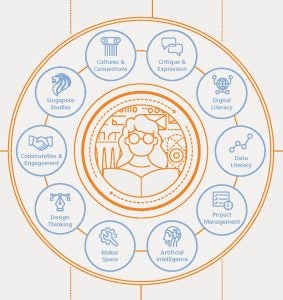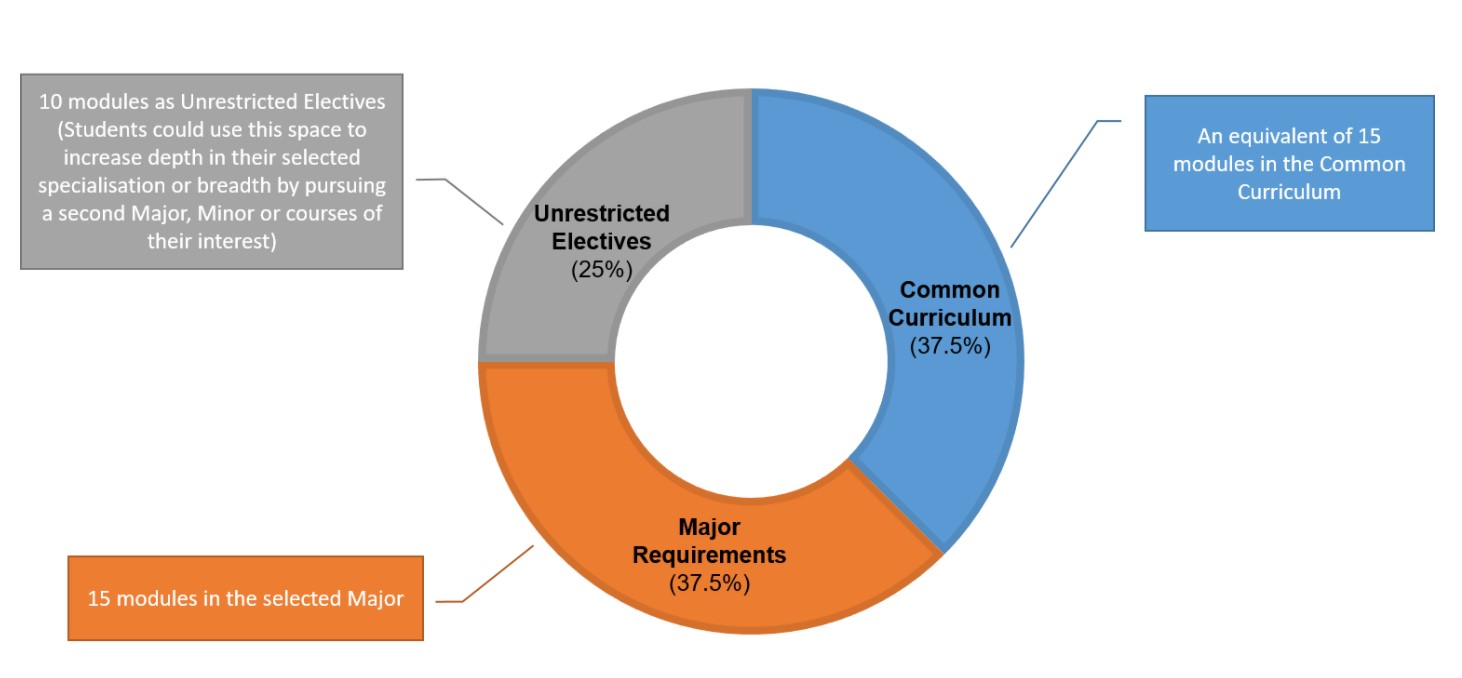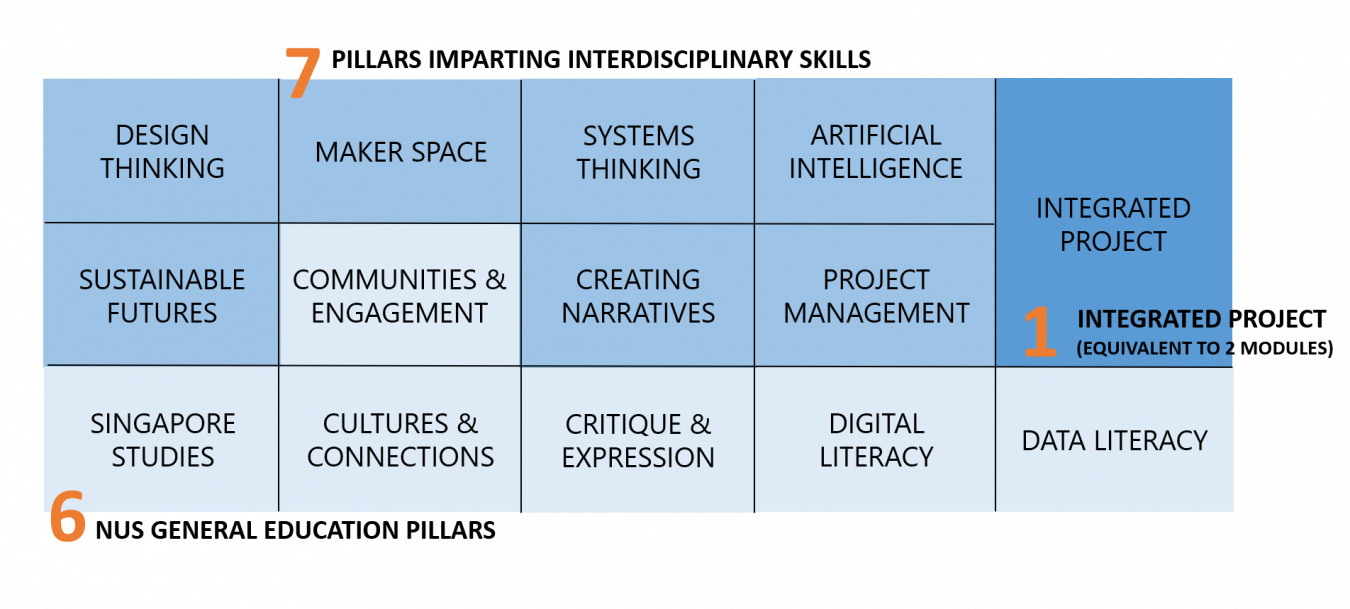Curriculum Structure
Important Notice
The College of Design and Engineering (CDE) has updated our degree requirements for students joining us from AY2025/2026 onwards. These changes represent an opportunity to update our requirements to remain aligned with the latest accreditation standards set by the Engineering Accreditation Board (EAB).
CDE has amended the current curriculum to include additional graduation requirements (with effect from AY2025/2026) for in-flight Bachelor of Engineering students.
The minimum number of additional technical courses you are required to read is based on your year of matriculation and your normal programme duration (NPD). The NPD for our Bachelor of Engineering degrees is four years for most students. For local polytechnic diploma holders who were awarded advanced placement credits, the NPD is three years. In general, the new requirement represents one additional technical course per year of study remaining. The table below shows the minimum number of additional technical courses required for each group of students.
Additional graduation requirements (with effect from AY2025/2026) Bachelor of Engineering:
| Year of Matriculation | Normal programme duration: Four years | Normal programme duration: Three years |
| AY2022/2023 | One additional technical course | None (due to graduate) |
| AY2023/2024 | Two additional technical courses | One additional technical course |
| AY2024/2025 | Three additional technical courses | Two additional technical courses |
For the following groups of students, you will not be affected by the new curriculum changes:
- Bachelor of Engineering:
- Cohorts AY2021/22 & earlier
- Cohort AY2022/2023 who have completed your degree requirements by the end of AY2024/2025
- Bachelor of Arts (Architecture): All cohorts
- Bachelor of Landscape Architecture: All cohorts
- Bachelor of Arts (Industrial Design): All cohorts
- Bachelor of Science (Project & Facilities Management): All cohorts
For any enquiries, please approach your respective departments for assistance.

The Common Curriculum consists of 10 carefully curated pillars to give a solid foundation in interdisciplinary skills. We emphasise instilling lifelong skills via the following pillars:
- Design Thinking
- Maker Space
- Artificial Intelligence
- Project Management
- Data Literacy
- Digital Literacy
- Critique and Expression
- Cultures and Connections
- Singapore Studies
- Communities and Engagement
Curriculum Structure

Students should complete a total of 160 units (or the equivalent of 40 courses), comprising:
-
- Common Curriculum: 40 units (or the equivalent of 10 courses)
- Primary Major: 80 units (or the equivalent of 20 courses)
- Unrestricted Electives: 40 units (or the equivalent of 10 courses)
These aim to provide CDE students with a comprehensive and well-rounded education, preparing them for success in their chosen careers and beyond.
Advanced Placement Credits & Exemptions (Cohorts 2025/2026 onwards)
Polytechnic diploma holders admitted to a 3 or 4 year programme may be granted advanced placement credits (APC) in relevant courses for up to a maximum of 40 units. 40 units is equivalent to 1 year of study.
The breakdown of the advanced placement credits (with effect from AY2015/2016 onwards) are as follows:
- Up to 20 Units for Unrestricted Elective Courses; and
- Up to 20 Units for Programme Requirements.
Eligible polytechnic diploma holders may opt to give up the 20 Units of APCs granted towards Unrestricted Electives, via the APC option exercise conducted in the second semester of study. More information can be found on the Office of the University Registrar's website.
Applicants presenting a Diploma from a Polytechnic in Singapore may refer to the links below for more information on course exemptions.
- Freshmen enrolling in AY2025/2026 (Engineering and Computer Engineering)
- Freshmen enrolling in AY2025/2026 (Architecture, Landscape Architecture and Industrial Design)
- Freshmen enrolling in AY2026/2027 (Engineering and Computer Engineering)
- Freshmen enrolling in AY2026/2027 (Architecture, Landscape Architecture and Industrial Design)
CDE has adopted a new undergraduate curriculum structure for students enrolled in the new academic year starting in August 2021. Students read a total of 160 units (or the equivalent of 40 courses), as shown in the following schema:

The Common Curriculum is jointly developed by CDE and 6 industry partners who sit on the task force. It seeks to integrates knowledge and skillsets relevant to the professional training offered by both schools and to equip students with essential 21st century competencies. The following pillars make up the Common Curriculum, comprising 60 units (or the equivalent of 15 courses):

Additional Graduation Requirement (with effect AY2025/2026)
| Year of Matriculation | Normal programme duration: Four years | Normal programme duration: Three years |
| AY2024/2025 | Three additional technical courses | Two additional technical courses |
You may utilize the following space in the Common Curriculum to read the additional technical courses:
- Systems Thinking: If you have not already read IE2141 Systems Thinking you can read an additional technical course to satisfy the Systems Thinking pillar in lieu of IE2141. Students from the BEng (Industrial and Systems Engineering) programme will read the course as an additional technical course within the Systems Thinking pillar. Thus, ISE students from the AY2024/2025 cohort must complete 8 additional units of technical courses.
- Creating Narratives: If you have not already read CDE2000 Creating Narratives you can read an additional technical course to satisfy the Creating Narratives pillar in lieu of CDE2000.
- Sustainable Futures: If you have not read a course in the Singapore Studies pillar you can use CDE2501 Liveable Cities to satisfy Singapore Studies and read an additional technical course to satisfy the Sustainable Futures pillar.
- If you do not have sufficient space in these three pillars you will need to use your Unrestricted Electives to read the additional technical courses.
- You can choose to read more than the minimum number of additional technical courses using these pillars or your Unrestricted Elective space.
List of Technical Courses for Substitution
- Biomedical Engineering
- Chemical Engineering
- Civil Engineering
- Computer Engineering
- Electrical Engineering
- Engineering Science
- Environmental & Sustainability Engineering
- Infrastructure & Project Management
- Industrial & Systems Engineering
- Materials Science & Engineering
- Mechanical Engineering
Advanced Placement Credits & Exemptions
Polytechnic diploma holders admitted to a 3 or 4 year programme may be granted advanced placement credits (APC) in relevant courses for up to a maximum of 40 units. 40 units is equivalent to 1 year of study.
The breakdown of the advanced placement credits (with effect from AY2015/2016 onwards) are as follows:
- Up to 20 Units for Unrestricted Elective Courses; and
- Up to 20 Units for Programme Requirements.
Eligible polytechnic diploma holders may opt to give up the 20 Units of APCs granted towards Unrestricted Electives, via the APC option exercise conducted in the second semester of study. More information can be found on the Office of the University Registrar's website.
Applicants presenting a Diploma from a Polytechnic in Singapore may refer to the links below for more information on course exemptions.
CDE has adopted a new undergraduate curriculum structure for students enrolled in the new academic year starting in August 2021. Students read a total of 160 units (or the equivalent of 40 courses), as shown in the following schema:

The Common Curriculum is jointly developed by CDE and 6 industry partners who sit on the task force. It seeks to integrates knowledge and skillsets relevant to the professional training offered by both schools and to equip students with essential 21st century competencies. The following pillars make up the Common Curriculum, comprising 60 units (or the equivalent of 15 courses):

Additional Graduation Requirement (with effect AY2025/2026)
| Year of Matriculation | Normal programme duration: Four years | Normal programme duration: Three years |
| AY2023/2024 | Two additional technical courses | One additional technical course |
You may utilize the following space in the Common Curriculum to read the additional technical courses:
- Systems Thinking: If you have not already read IE2141 Systems Thinking you can read an additional technical course to satisfy the Systems Thinking pillar in lieu of IE2141. Students from the BEng (Industrial and Systems Engineering) programme will read the course as an additional technical course within the Systems Thinking pillar. Thus, ISE students from the AY2023/2024 cohort must complete 4 additional units of technical courses.
- Creating Narratives: If you have not already read CDE2000 Creating Narratives you can read an additional technical course to satisfy the Creating Narratives pillar in lieu of CDE2000.
- Sustainable Futures: If you have not read a course in the Singapore Studies pillar you can use CDE2501 Liveable Cities to satisfy Singapore Studies and read an additional technical course to satisfy the Sustainable Futures pillar.
- If you do not have sufficient space in these three pillars you will need to use your Unrestricted Electives to read the additional technical courses.
- You can choose to read more than the minimum number of additional technical courses using these pillars or your Unrestricted Elective space.
List of Technical Courses for Substitution
- Biomedical Engineering
- Chemical Engineering
- Civil Engineering
- Computer Engineering
- Electrical Engineering
- Engineering Science
- Environmental & Sustainability Engineering
- Infrastructure & Project Management
- Industrial & Systems Engineering
- Materials Science & Engineering
- Mechanical Engineering
Advanced Placement Credits & Exemptions
Polytechnic diploma holders admitted to a 3 or 4 year programme may be granted advanced placement credits (APC) in relevant courses for up to a maximum of 40 units. 40 units is equivalent to 1 year of study.
The breakdown of the advanced placement credits (with effect from AY2015/2016 onwards) are as follows:
- Up to 20 Units for Unrestricted Elective Courses; and
- Up to 20 Units for Programme Requirements.
Eligible polytechnic diploma holders may opt to give up the 20 Units of APCs granted towards Unrestricted Electives, via the APC option exercise conducted in the second semester of study. More information can be found on the Office of the University Registrar's website.
Applicants presenting a Diploma from a Polytechnic in Singapore may refer to the links below for more information on course exemptions.
CDE has adopted a new undergraduate curriculum structure for students enrolled in the new academic year starting in August 2021. Students read a total of 160 units (or the equivalent of 40 courses), as shown in the following schema:

The Common Curriculum is jointly developed by CDE and 6 industry partners who sit on the task force. It seeks to integrates knowledge and skillsets relevant to the professional training offered by both schools and to equip students with essential 21st century competencies. The following pillars make up the Common Curriculum, comprising 60 units (or the equivalent of 15 courses):

Additional Graduation Requirement (with effect AY2025/2026)
| Year of Matriculation | Normal programme duration: Four years | Normal programme duration: Three years |
| AY2022/2023 | One additional technical course | None (due to graduate) |
You may utilize the following space in the Common Curriculum to read the additional technical courses:
- Systems Thinking: If you have not already read IE2141 Systems Thinking you can read an additional technical course to satisfy the Systems Thinking pillar in lieu of IE2141.
- Creating Narratives: If you have not already read CDE2000 Creating Narratives you can read an additional technical course to satisfy the Creating Narratives pillar in lieu of CDE2000.
- Sustainable Futures: If you have not read a course in the Singapore Studies pillar you can use CDE2501 Liveable Cities to satisfy Singapore Studies and read an additional technical course to satisfy the Sustainable Futures pillar.
- If you do not have sufficient space in these three pillars you will need to use your Unrestricted Electives to read the additional technical courses.
- You can choose to read more than the minimum number of additional technical courses using these pillars or your Unrestricted Elective space.
List of Technical Courses for Substitution
- Biomedical Engineering
- Chemical Engineering
- Civil Engineering
- Computer Engineering
- Electrical Engineering
- Engineering Science
- Environmental & Sustainability Engineering
- Infrastructure & Project Management
- Industrial & Systems Engineering
- Materials Science & Engineering
- Mechanical Engineering
Advanced Placement Credits & Exemptions
Polytechnic diploma holders admitted to a 3 or 4 year programme may be granted advanced placement credits (APC) in relevant courses for up to a maximum of 40 units. 40 units is equivalent to 1 year of study.
The breakdown of the advanced placement credits (with effect from AY2015/2016 onwards) are as follows:
- Up to 20 Units for Unrestricted Elective Courses; and
- Up to 20 Units for Programme Requirements.
Eligible polytechnic diploma holders may opt to give up the 20 Units of APCs granted towards Unrestricted Electives, via the APC option exercise conducted in the second semester of study. More information can be found on the Office of the University Registrar's website.
Applicants presenting a Diploma from a Polytechnic in Singapore may refer to the links below for more information on course exemptions.
CDE has adopted a new undergraduate curriculum structure for students enrolled in the new academic year starting in August 2021. Students read a total of 160 units (or the equivalent of 40 courses), as shown in the following schema:

The Common Curriculum is jointly developed by CDE and 6 industry partners who sit on the task force. It seeks to integrates knowledge and skillsets relevant to the professional training offered by both schools and to equip students with essential 21st century competencies. The following pillars make up the Common Curriculum, comprising 60 units (or the equivalent of 15 courses):

Advanced Placement Credits & Exemptions (Cohorts 2021/2022 onwards)
Polytechnic diploma holders admitted to a 3 or 4 year programme may be granted advanced placement credits (APC) in relevant courses for up to a maximum of 40 units. 40 units is equivalent to 1 year of study.
The breakdown of the advanced placement credits (with effect from AY2015/2016 onwards) are as follows:
- Up to 20 Units for Unrestricted Elective Courses; and
- Up to 20 Units for Programme Requirements.
Eligible polytechnic diploma holders may opt to give up the 20 Units of APCs granted towards Unrestricted Electives, via the APC option exercise conducted in the second semester of study. More information can be found on the Office of the University Registrar's website.
Applicants presenting a Diploma from a Polytechnic in Singapore may refer to the links below for more information on course exemptions.
The NUS undergraduate curriculum ensures broad-based learning combined with depth of specialisation, and comprises 3 components: University Level Requirements (ULR), Programme Requirements and Unrestricted Elective (UEs). Workload is measured in terms of units, where each unit is the equivalent of 2.5 hours of work per week (including assignments and self-study) – most modules are typically 4 units.
| Summary of the BEng curriculum for students matriculated in AY2019/2020 and AY2020/2021 | |||
| University Level Requirements (ULR) | Programme Requirements | Unrestricted Electives
(UEs) |
|
| Faculty Requirements | Major (Discipline) Requirements | ||
| 5 General Education Courses
(GEs) |
Engineering Core Courses | Major (Discipline) Core Courses | Any course open to you; may be used to fulfil requirements for specialisations, second majors or minors |
| Technical Electives | |||
| Pathway Electives | |||
| Internship* | |||
| Project | |||
| 20 units | 42 units^ | 66 units^ | 32 units^ |
| Minimum required for graduation: 160 units | |||
* Internship is optional if you are a polytechnic graduate admitted directly to Year 2
Internship is also optional if you are in a special programme (i.e. E-Scholars, double-degree, concurrent degree) – the units for internship can be utilised as UEs
^ There are slight variations among BEng programmes, although the minimum number of units required for graduation remains at 160 units. Please see the details under each individual programme
Read more about General Education
Read more about the BEng Common Core
Read more about the Differentiated Pathways
Find out how your academic performance is assessed, including details of the grade-free scheme (Satisfactory/Unsatisfactory Option)
Find out more about the Advanced Placement Credits & Exemptions available


